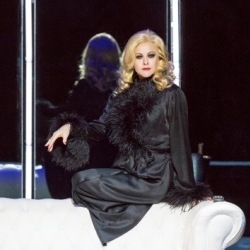Manon Lescaut (WNO)
Puccini’s version of the time-honoured tale by Abbé Prévost receives an oblique new production from Welsh National Opera
When I walked into the theatre I thought for a moment that I’d got my dates wrong and was about to see Hans Werner Henze’s Boulevard Solitude (the third show in WNO’s current 'Fallen Women' triptych) rather than Puccini’s lush melodrama Manon Lescaut.

© Johan Persson
Mariusz Trelinski‘s relentlessly dark, frequently baffling production updates the action to a contemporary metro station, stripping away any patina of romanticism and throwing the focus squarely onto the Chevalier des Grieux. The set does indeed do double duty for Boulevard Solitude, and at times it felt that the parallels had been stretched to breaking-point, with Manon Lescaut getting the raw deal.
Some (OK, a lot) of it jars. There were sceptical audience titters when Manon (presented here as a vampish hustler from the outset) announces that she’s en route to a convent, and it’s a bit of a jolt when the surtitles tell us that des Grieux is a ‘theology student’ rather than the commute-weary middle manager the production suggests. Most confusing of all is the final act, where des Grieux is haunted by doppelgangers representing the different fantasies which he has projected onto Manon (it’s ultimately unclear whether she does – or indeed can – actually die).
Gwyn Hughes Jones sang tirelessly in the taxing role of des Grieux, riding the heaviest orchestration even when Lothar Koenigs let his forces right off the leash (and mighty thrilling they were, too – a spectacular return to form after an unsettled La traviata). The Welsh tenor may not possess the vocal glamour and range of colour that characterise the very best exponents of this repertoire, but the sound is robust and Italianate with a proper spinto weight and ringing top.
His Manon, Chiara Taigi, fielded a big, dusky, voluptuous soprano, so dark and metallic in the lower register that she could almost be mistaken for a dramatic mezzo in places. That her timbre doesn’t really lend itself to innocence worked in the service of Trelinski’s characterisation, and that her two great arias didn’t activate the tear-ducts had more to do with the lack of interiority granted by the director than with Taigi’s lovely pianissimos and innate sense of line.
Versatile WNO regular David Kempster delivered a vivid, multi-faceted portrayal of Manon’s exploitative brother, creepily incestuous at times, oddly sympathetic at others. The company has some first-rate comprimario singers on its books at the moment, and Simon Crosby Buttle was excellent as a hi-vis-jacketed Edmondo, commenting on the action like a Shakespearean wise fool.
As an introduction to one of Puccini’s lesser-known operas, it’s far from ideal. My companion grumbled that it managed to be explicit and obfuscating at the same time, and much of the surrounding chat in the bar afterwards suggested that there was widespread audience confusion about Manon’s eventual fate.
I appreciated this production far more 24 hours after the event than I did at curtain-down, especially after reading an excellent if intellectually hyperactive interview with Trelinski via Wales Arts Review. (Perhaps WNO could have provided something similar in their extensive programme, rather than a series of generalised essays on femmes fatales and consumption which seemed partly recycled from a recent season’s material on Free Spirits.)
Trelinski provided much food for thought on the opera and on Puccini’s women in general, but left me wondering just how successful a production can be deemed to be if it requires extensive director’s notes to make its retrospective impact.












